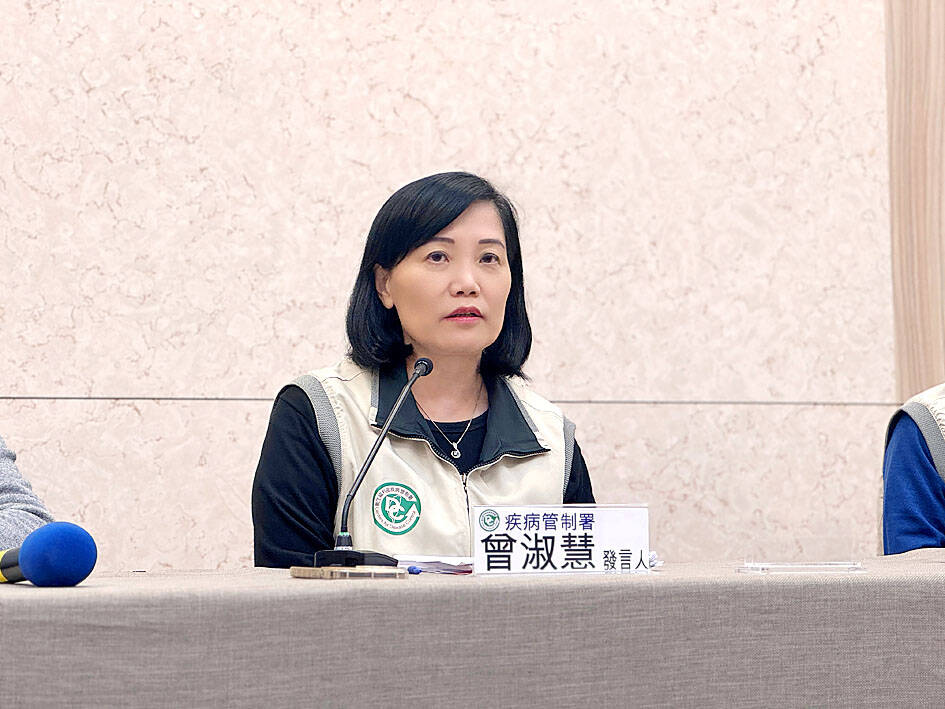The Centers for Disease Control (CDC) yesterday reported the first death from enterovirus this year, a baby girl younger than a month old in northern Taiwan.
On Feb. 16, the baby was hospitalized due to rapid breathing and decreased movement, which developed into a fever and breathing difficulties three days later.
She was put into a neonatal intensive care unit on Feb. 20.

Photo: Chiu Chih-jou, Taipei Times
The baby passed away on Sunday due to multiple organ failure and sepsis. Laboratory tests found that she had been infected with echovirus 11.
The baby was born at a healthy weight with no underlying conditions, but newborns are particularly susceptible to echovirus 11 due to their weak immune system, CDC Deputy Director-General and spokeswoman Tseng Shu-hui (曾淑慧) said, adding that the virus can come on suddenly.
Although cases of enterovirus are low in Taiwan, there still remains a risk, she said.
Tseng warned families with babies and pregnant women to regularly wash their hands with soap and to avoid contact with babies if they feel unwell.
Babies who are infected with enterovirus usually begin to show symptoms one to 14 days after birth, starting with a mild fever and decreased appetite, which could escalate to encephalitis, pneumonia and even organ failure, the CDC said.
Pregnant women experiencing fever, a cough or a sore throat up to 14 days before or after childbirth should alert healthcare professionals, it added.
CDC data showed that over the past four weeks, enterovirus A16, A6 and A2 have been spreading through the community.
The echovirus strain was also detected.
Enterovirus cases usually rise from March to April as the new school term starts, the CDC said, warning parents, childcare facilities and hospital nurseries to take precautions.
The occurrence of severe cases indicates ongoing community transmission, MacKay Children’s Hospital pediatrician Peng Chun-chih (彭純芝) said.
Expectant women are recommended to take note of their contact history up to two weeks before childbirth and to avoid visiting crowded public spaces, she added.

The Ministry of Economic Affairs has fined Taobao NT$1.2 million (US$36,912) for advertisements that exceed its approved business scope, requiring the Chinese e-commerce platform to make corrections in the first half of this year or its license may be revoked. Lawmakers have called for stricter enforcement of Chinese e-commerce platforms and measures to prevent China from laundering its goods through Taiwan in response to US President Donald Trump’s heavy tariffs on China. The Legislative Yuan’s Finance Committee met today to discuss policies to prevent China from dumping goods in Taiwan, inviting government agencies to report. Democratic Progressive Party Legislator Kuo Kuo-wen (郭國文) said

The Ministry of Economic Affairs has fined Taobao NT$1.2 million (US$36,900) for advertisements that exceeded its approved business scope and ordered the Chinese e-commerce platform to make corrections in the first half of this year or its license would be revoked. Lawmakers have called for stricter supervision of Chinese e-commerce platforms and more stringent measures to prevent China from laundering its goods through Taiwan as US President Donald Trump’s administration cracks down on origin laundering. The legislature’s Finance Committee yesterday met to discuss policies to prevent China from dumping goods in Taiwan, inviting government agencies to report on the matter. Democratic Progressive Party

Taiwan and its Pacific ally Tuvalu on Tuesday signed two accords aimed at facilitating bilateral cooperation on labor affairs, according to Taiwan’s Ministry of Foreign Affairs (MOFA). The governments inked two agreements in Taipei, witnessed by Foreign Minister Lin Chia-lung (林佳龍) and visiting Deputy Tuvaluan Prime Minister Panapasi Nelesone, MOFA said in a news release. According to MOFA, the agreements will facilitate cooperation on labor issues and allow the two sides to mutually recognize seafarers’ certificates and related training. Taiwan would also continue to collaborate with Tuvalu across various fields to promote economic prosperity as well as the well-being of their

Sung Chien-liang (宋建樑), who led efforts to recall Democratic Progressive Party (DPP) Legislator Lee Kun-cheng (李坤城), was released on bail of NT$80,000 today amid outcry over his decision to wear a Nazi armband to questioning the night before. Sung arrived at the New Taipei District Prosecutors’ Office for questioning in a recall petition forgery case last night wearing a red armband bearing a swastika, carrying a copy of Adolf Hitler’s Mein Kampf and giving a Nazi salute. Sung left the building at 1:15am without the armband and covering the book with his coat. Lee said today that this is a serious